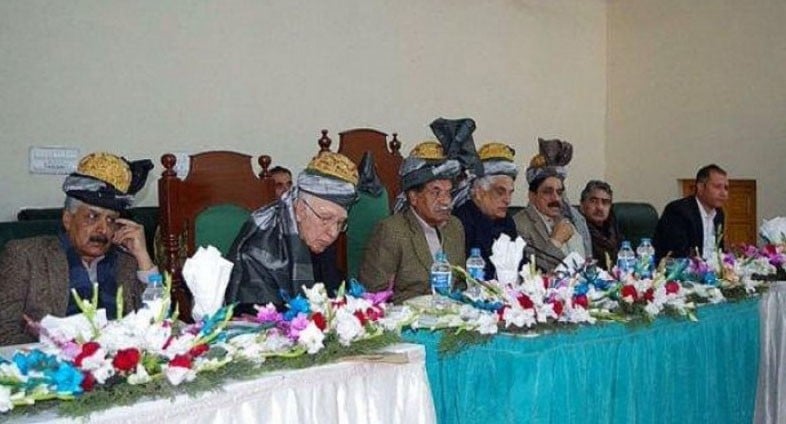

In a security state like Pakistan, legal, constitutional and political reforms are easy to institute when the state is confronted with strategic imperatives.
This is the underlying story of reforms in Pakistani tribal areas. The US invasion of Afghanistan and, more specifically, the battle of Tora Bora in December 2001, close to Pakistani tribal areas, generated the strategic imperative of making tribal areas a buffer against the impact of militancy on mainland Khyber Pukhtunkhwa.
Pakistan army entered tribal areas in 2002 and in these 16 intervening years transformed the political and socio-economic landscape of the tribal areas. Two of the governments that were in power during this time-- Musharraf’s military government and the PPP government -- tried their best to reform the legal, constitutional and political framework of tribal areas, but generally over the years a lack of concrete legal and political reforms not only kept Fata out of the mainstream but also resulted in exacerbating militancy and extremism in the region.
Until the introduction of adult franchise in Fata in 1997, the residents did not even have the right to vote. Similarly, for years the legislative authority for the region remained vested in the President of Pakistan.
During military dictator General Ziaul Haq’s rule the state was confronted with the strategic imperative of securing mainland Pakistan from the impact of the Soviet occupation of Afghanistan. At that time the state did not see any necessity to institute legal, constitutional or political reforms in the administration of the tribal areas. Instead, the short-sightedness of the military dictator led him to inject radical Islam and militancy into the region with the help of foreign military and financial assistance.
Prior to Zia, the government of prime minister Zulfikar Ali Bhutto introduced some development schemes in the tribal region, resulting in the improvement of physical infrastructure and establishment of schools and colleges in Fata. The Federal Ministry of State and Frontier Regions (SAFRON) and the Fata Development Authority were also established. In 1976, Prime minister Zulfikar Ali Bhutto formed a committee under Gen Naseerullah Babar. The committee included Hafeez Pirzada, Rafi Raza and Dr Mubashar Hassan. Its aim was to create a framework that would allow Fata to become a part of NWFP. But once the military coup happened in July 1977, bringing General Zia-ul-Haq into power, reforms in Fata no longer suited the establishment.
General Zia’s military government did not start any major developmental projects in Fata. Instead, the interests of the army and intelligence agencies (not only Pakistani but other foreign intelligence) in the region introduced militancy and radical Islam into the region because of its importance as a staging ground for proxy war against the Soviet Union.
Jumping forward, in 1996, the PPP government promulgated Adult Franchise Act for the people of the tribal areas. This was the first real reform aimed at the political empowerment of Fata residents. For the first time in history, the people of Fata were given the right to vote.
The fourth PPP government (2008-2013) was even more proactive in introducing political reforms in the region, primarily because it was operating in a post-US invasion of Afghanistan environment. Since Pakistan’s creation political parties were not allowed to engage in any political activity in the tribal belt. The 2011 reforms package allowed political parties to engage in political activity in the tribal areas.
The lifting of curbs on political campaigns in Fata not only allowed political parties to offer their manifestos to the people, they also brought deprived people into the national mainstream. The same PPP government introduced local government structures in tribal areas.
Earlier, the military government of General Musharraf introduced its own reforms in the region aimed at increasing the administrative and judicial capacity of government structures in tribal areas.
In 2002, the military government established Fata secretariat which in 2006 became the civil secretariat for the implementation of different development projects in the region. Before this, the federal government’s development projects had been implemented by the relevant provincial government’s departments.
The subsequent PPP government extended the authority of Federal Ombudsman to Fata, allowing the locals to file complaints with the Federal Ombudsman against the decisions of the Fata secretariat.
The reforms package introduced by the PPP government in 2011 included the provision for the establishment of a Fata tribunal which allowed the locals to challenge the judicial decisions of Political Agent, which was the highest judicial authority in the region before these reforms.
In 2011, another vital reform was introduced which was warmly welcomed by the residents of Fata. The reform exempted the elderly and children from arrest under the FCR. A six-member committee on Fata reforms was formed in November 2015 by then Prime Minister Nawaz Sharif under the chairmanship of Sartaj Aziz, Adviser to the Prime Minister on Foreign Affairs, to start working with immediate effect and to propose a concrete way forward for the political mainstreaming of Fata. Other members of the committee included KP Governor Zafar Iqbal Jhagra, Minister for SAFRON Lt. Gen (retd) Abdul Qadir Baloch, Minister for Law and Justice Zahid Hamid, National Security Adviser Lt. Gen. (Retd) Nasser Khan Janjua and Secretary SAFRON Muhammad Shehzad Arbab.
Read also: Plan for the police
The mother of all reforms, however, has just come in May 2018 with Fata’s merger into Khyber Pukhtunkhwa, with the assistance of almost the entire political class. The full legislative authority of the parliament over Fata region has been established with the merger of Fata with KP.
Fata has been given 21 seats in the KP Assembly, including 16 general, four for women and one reserved for non-Muslims "provided that elections to the aforesaid seats shall be held within one year after the general elections 2018," according to the bill.